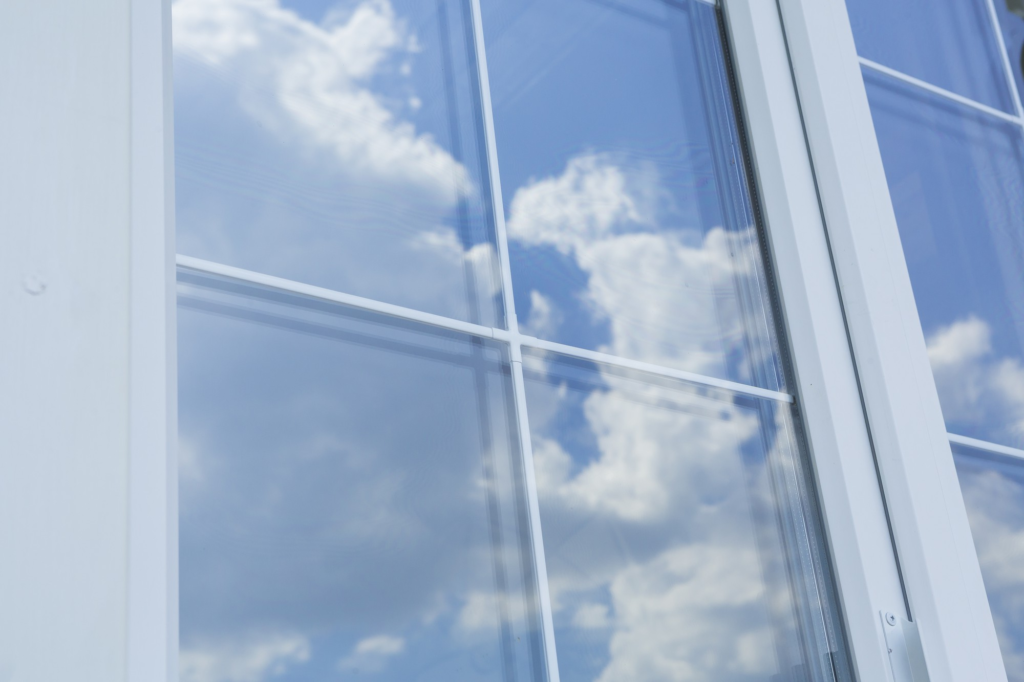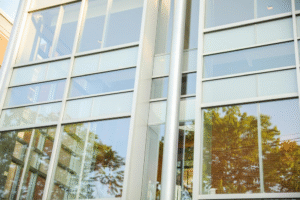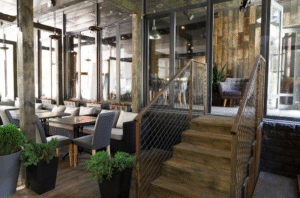
Selecting the correct types of glass for windows is essential for ensuring your house meets your needs for thermal insulation, noise reduction, privacy, and safety. However, with so many options available, making the right choice can be difficult.
Different window glasses offer unique benefits, and understanding these characteristics can help you create a comfortable and secure living environment.
This article explores the most common types of glass for windows, their specific features, and how to decide which one suits your space. Check it out!
Main Types of Glass for Windows and Their Applications
All types of glass for windows serve specific purposes, from enhancing energy efficiency to improving security and privacy.
Here is an overview of the primary options and their ideal applications:
Double-pane glass: Thermal and acoustic insulation
Double-pane glass, also known as insulated glass, consists of two glass panels separated by a layer of air or inert gas. This design provides excellent thermal insulation, reducing winter heat loss and minimizing summer heat gain. Also, it dampens external noise, making it ideal for homes in urban or noisy areas.
- Best for: Energy efficiency, soundproofing, and climate control.
Tempered glass: Safety and durability
Tempered glass is heat-treated to increase its strength compared to standard glass. If it breaks, it shatters into small, rounded pieces, reducing the risk of injury. It is an excellent choice for windows in high-traffic areas or spaces prone to impact.
- Best for: Safety, durability, and compliance with building codes.
Laminated glass: Impact resistance
Laminated glass comprises two or more layers bonded with a plastic interlayer. This construction prevents the glass from breaking into sharp fragments, even when cracked, offering superior protection against break-ins or extreme weather conditions.
- Best for: High-security needs, hurricane-prone areas, and soundproofing.
Frosted or opaque glass: Privacy
Frosted or opaque glass diffuses light while obscuring visibility, providing privacy in areas like bathrooms or ground-floor windows. Offered in various finishes, it blends practicality with visual appeal.
- Best for: Privacy-focused spaces such as bathrooms or offices.
Low-E glass: Energy efficiency
Low-emissivity glass features a special coating that reflects heat while allowing natural light to pass through. This technology enhances the window’s energy efficiency, helping to reduce heating and cooling costs throughout the year.
- Best for: Energy savings, climate control, and UV protection.
Now that you understand these popular types of glass for windows and their uses, let’s dive deeper into the key features of different window designs, tailored to various situations and requirements.
Types of Glass for Windows with Thermal and Acoustic Insulation: What Works Best
Choosing the right types of glass for windows is essential when it comes to creating a comfortable and quiet living space.
The correct glass can reduce noise pollution and regulate indoor temperatures. Let’s explore the most famous choices for this purpose.
Double-glazed glass
Double-glazed, or insulated glass, consists of two glass panes separated by a layer of air or gas. This design functions as a barrier, reducing heat transfer and dampening sound. It’s effective in cold and hot climates, maintaining a stable indoor temperature.
- Thermal benefits: Double-glazed glass reduces heat loss in winter and minimizes heat gain in summer, making it a favorite for energy-efficient homes.
- Acoustic benefits: The gap between the panes absorbs sound vibrations, providing excellent noise insulation in urban or noisy areas.
- Best for: Homes in extreme climates or near high-traffic areas.
Laminated Glass
While commonly associated with safety, laminated glass also excels in acoustic insulation. The interlayer helps block sound waves, creating a quieter indoor environment.
- Thermal benefits: Though less effective than double-glazed glass, laminated glass offers moderate thermal insulation when paired with energy-efficient coatings.
- Acoustic benefits: Its unique structure dampens sound transmission, making it ideal for reducing noise in bustling neighborhoods or near airports, for example.
- Best for: Offices, urban apartments, and spaces requiring a balance of safety and soundproofing.
Low-E Glass
Low-emissivity (Low-E) glass has a microscopically thin coating designed to reflect heat while allowing light to pass through. When used with double glazing, it enhances thermal insulation without compromising natural light.
- Thermal benefits: In winter, it keeps heat indoors, and in summer, it reflects outdoor heat, reducing HVAC costs.
- Acoustic benefits: While not primarily designed for soundproofing, it performs well when paired with insulated or laminated glass.
- Best for: Energy-conscious homeowners in climates with significant temperature variations.
Selecting the Right Insulation Glass for You
Deciding on the right types of glass for windows depends on your environment and priorities. For superior thermal and acoustic performance, double-glazed glass is a standout choice. Laminated glass provides excellent soundproofing and added security, while Low-E glass enhances energy efficiency.
To maximize the benefits, consider combining these options, such as Low-E and double-glazed glass, for unparalleled insulation.
Types of Glass for Windows for Safety and Durability: Protection Against Impact and Breakage

Certain glasses are designed to withstand impacts and deter breakage, making them ideal for homes in high-risk areas or if you are looking to boost the overall security of your space.
Let’s explore two of the best types of glass for windows for safety and durability.
Tempered glass
Tempered glass is processed through a thermal or chemical treatment to increase its strength.
- How it’s made: The glass is heated to a high temperature and then rapidly cooled, creating a strengthened surface.
- Key benefits:
- Four to five times stronger than standard glass, making it difficult to break.
- The shattering mechanism minimizes hazards during accidental breakage.
- Ideal applications: Sliding doors, shower enclosures, and areas exposed to potential impact, such as patio doors.
Laminated glass
Laminated glass is created by sandwiching a plastic interlayer, typically made of polyvinyl butyral (PVB), between two layers of glass. This structure keeps the glass intact even after an impact, making it a preferred choice for high-security installations.
- How it’s made: Two glass sheets are bonded with a durable interlayer under heat and pressure.
- Key benefits:
- Designed to resist penetration, even under repeated strikes, making it an effective deterrent against break-ins.
- The interlayer holds the fragments together, preventing dangerous shards.
- Offers additional acoustic insulation.
- Ideal applications: Skylights, storefronts, and windows in hurricane-prone areas.
Comparing tempered and laminated
- Tempered Glass is ideal for areas requiring strength and safety without the risk of shattering into sharp fragments.
- Laminated Glass is better for locations needing maximum impact resistance and shatterproof properties, such as homes in storm-prone regions.
Why choose the right types of glass for windows for safety?
The right types of glass for windows protect your property from break-ins and prevent injuries during accidents. You can enhance your home design and security by incorporating tempered or laminated glass into your home.
Types of Glass for Windows: What Works Best for Each Room
Selecting the right types of glass for windows for different areas of your home is essential for creating a comfortable, functional, and aesthetically pleasing living space.
Each room has unique requirements, from privacy and insulation to security and design. Let’s explore them now!
Living Room
The living room is a central gathering space where natural light and energy efficiency are key priorities.
- Recommended glass types:
- Low-E glass: Maximizes natural light while reducing heat transfer, improving energy efficiency all year.
- Double-glazed glass: Provides excellent thermal insulation and reduces noise, perfect for homes in busy areas.
- Design tip: Floor-to-ceiling windows or large Low-E glass panels create a modern, open feel without compromising insulation.
Bedroom
Bedrooms require a peaceful, private environment with good thermal and acoustic insulation.
- Recommended glass types:
- Laminated glass: Reduces noise, making it ideal for restful sleep in urban or high-traffic areas.
- Frosted or opaque glass: Ensures privacy while allowing natural light to enter.
- Design tip: Use frosted glass for upper window panels or layered drapes for added privacy and light control.
Kitchen
Kitchens combine functionality with style while also being safe and easy to clean.
- Recommended glass types:
- Tempered glass: Ideal for areas prone to high temperatures and impacts, such as near stoves or countertops.
- Textured glass: Adds a decorative element while hiding clutter or mess behind glass cabinets.
- Design yip: Pair tempered glass with stylish frames for a sleek, modern kitchen look.
Bathroom
Bathrooms need maximum privacy and materials that can withstand high humidity levels.
- Recommended glass types:
- Tempered glass: A must-have for shower enclosures offering exceptional durability and enhanced safety.
- Frosted glass: Offers complete privacy while maintaining an airy feel.
- Design Tip: Combine frosted and clear tempered glass for a spa-like aesthetic.
Home Office
A home office only benefits from soundproofing and glare reduction.
- Recommended glass types:
- Laminated glass: Reduces outside noise, creating a quieter workspace.
- Tinted glass: Minimizes glare from the sun, ideal for workspaces with computer screens.
- Design tip: Consider frosted glass partitions to separate the home office from other living areas without compromising on style.
Entryway and Front Door
The entryway makes the first impression while also providing security.
- Recommended glass types:
- Laminated glass: Enhances security by resisting impacts and break-ins.
- Decorative or stained glass: Adds a unique, welcoming aesthetic to the home’s entrance.
- Design tip: Combine decorative glass with laminated panels for an attractive yet secure design.
Tips for Combining Different Types of Glass for Windows

Consider using a mix of types of glass for windows tailored to each room’s needs to achieve a cohesive and functional home:
- Match types of glass for windows that enhance privacy with energy-efficient options for spaces like bathrooms and bedrooms.
- Use decorative glass in entryways and living spaces for aesthetic appeal without compromising insulation.
- Consider consulting professionals to ensure the best combination of glass types for your climate and lifestyle.
Take the Next Step and Choose Between the Types of Glass for Windows
Choosing the right types of glass for windows is essential for creating a home that meets your needs for comfort, privacy, security, and energy efficiency.
You can improve your home’s functionality and aesthetics by carefully considering the requirements of each room and the benefits of different glass options.
Ready to explore the best types of glass for windows tailored to your needs?
Top Notch Remodeling installation services go beyond expectations, and our team can provide a personalized quote to help you choose between the types of glass for windows.



